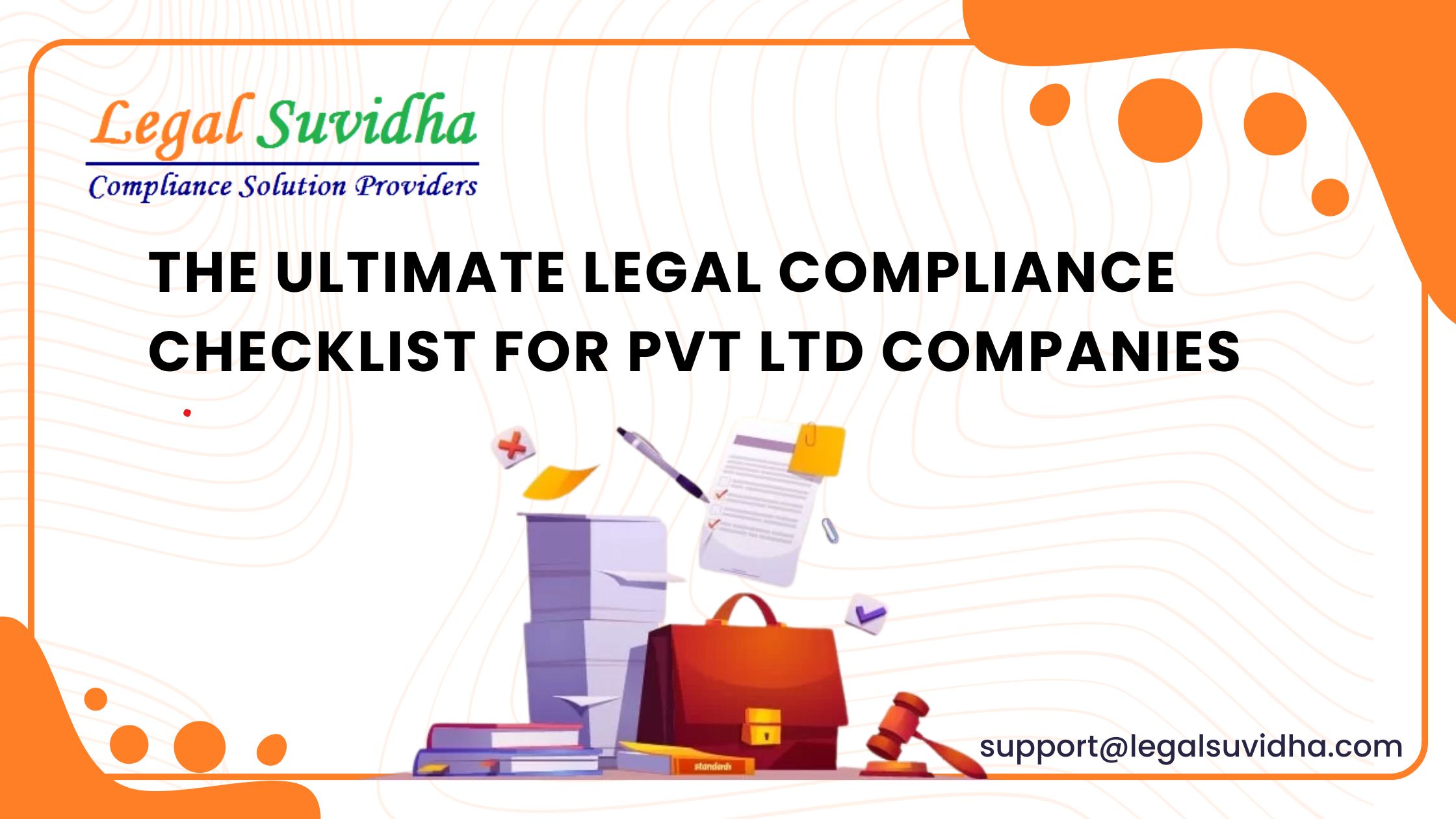The Ultimate Legal Compliance Checklist for Pvt Ltd Companies
Introduction
In today’s business world, making sure you follow the law is crucial for Pvt Ltd companies. Following rules not only helps you avoid legal trouble but also builds trust with your partners and keeps your business running smoothly. This easy-to-follow legal compliance checklist will help Pvt Ltd companies manage their legal duties, so you stay on track and can focus on growing your business.
1. Company Registration and Structure
Registration
- Incorporation Form (SPICe+): This important form is needed to register your company and must be filled out correctly. It includes information about your company’s directors, shareholders, and office address.
- Memorandum of Association (MOA) and Articles of Association (AOA): These documents explain your company’s goals, setup, and rules.
- Director Identification Number (DIN): Get DINs for all your directors.
- Proof of Address and Identity: Provide valid proof of address for your company’s office and identity proof for all directors.
Structure
- Board of Directors: Make sure the board meets legal standards and check the roles of directors.
- Shareholders: Keep accurate records of your shareholders and their shares.
2. Compliance with Statutory Requirements
Annual Filings
- Annual Return (MGT-7): File this within 60 days from the AGM date.
- Financial Statements (AOC-4): File your balance sheet, profit and loss account, and auditor’s report along with the annual return.
Director’s Report
- Financial Performance: A summary of how your business is doing financially.
- Corporate Developments: Major changes and updates within your company.
- Future Outlook: Briefly discuss future plans and prospects.
3. Corporate Governance
Board Meetings
- Frequency: Hold at least four board meetings every year.
- Documentation: Keep detailed minutes and resolutions of all board meetings.
Shareholder Meetings
- AGMs: Conduct AGMs within six months of the end of the financial year.
- EGMs: Arrange EGMs when needed for special decisions or urgent issues.
Minutes of Meetings
- Board Meetings: Record discussions, decisions, and resolutions.
- AGMs and EGMs: Document the details and outcomes of shareholder meetings.
4. Tax Compliance
Income Tax
- Filing Income Tax Returns (ITR): Make sure to file on time to avoid penalties.
- Tax Deducted at Source (TDS): Follow TDS rules for salaries, interest, and professional fees.
Goods and Services Tax (GST)
- GST Registration: Register for GST if your turnover is above the set limit.
- GST Returns: File returns monthly or quarterly.
5. Financial Compliance
Audit Requirements
- Appointment of Auditors: Appoint auditors within 30 days of starting your company.
- Annual Audit: Do an annual audit of your company’s financial records.
Maintenance of Books of Accounts
- Record-Keeping: Keep detailed accounts.
- Retention Period: Store records for at least eight years.
6. Labor Law Compliance
Employee Benefits
- Provident Fund (PF): Make regular PF contributions.
- Employee State Insurance (ESI): Follow ESI rules.
Labor Laws
- Payment of Gratuity Act: Follow rules for gratuity payments.
- Minimum Wages Act: Adhere to state-specific minimum wage laws.
7. Legal Documentation
Contracts and Agreements
- Legal Contracts: Create and keep contracts for business deals.
- Internal Policies: Set up internal policies on employee conduct, data protection, and workplace safety.
8. Intellectual Property
Trademark Registration
- Process: Register trademarks to protect your brand.
- Benefits: Trademark registration gives you exclusive rights to the trademark.
Patents and Copyrights
- Protection: Get patents and copyrights for your intellectual property.
9. Data Protection and Privacy
Compliance with Data Protection Laws
- Regulations: Follow data protection laws like the Personal Data Protection Bill (PDPB).
- Data Security: Put measures in place to protect data from breaches.
10. Miscellaneous Compliance
Compliance with Sector-Specific Regulations
- Industry Regulations: Follow specific rules for your industry.
Licenses and Permits
- Acquisition of Licenses: Get the necessary licenses and permits based on what your business does.
FAQs
1. What is the penalty for not following the rules in Pvt Ltd companies?
Penalties can vary depending on the type and extent of non-compliance. They may include fines, director disqualification, or even closing the company.
2. How often do we need to hold board meetings?
According to the Companies Act, 2013, Pvt Ltd companies must hold at least four board meetings each year, with no more than 120 days between meetings.
3. Is GST registration mandatory for Pvt Ltd companies?
Yes, if your company’s annual turnover is above the limit (currently Rs. 20 lakhs for service providers and Rs. 40 lakhs for goods providers).
4. How long should we keep financial records?
As per the Companies Act, financial records must be kept for at least eight years.
5. What happens if we don’t file annual returns?
Not filing annual returns can lead to penalties, including late fees, director disqualification, and the company being removed from the company register.




















